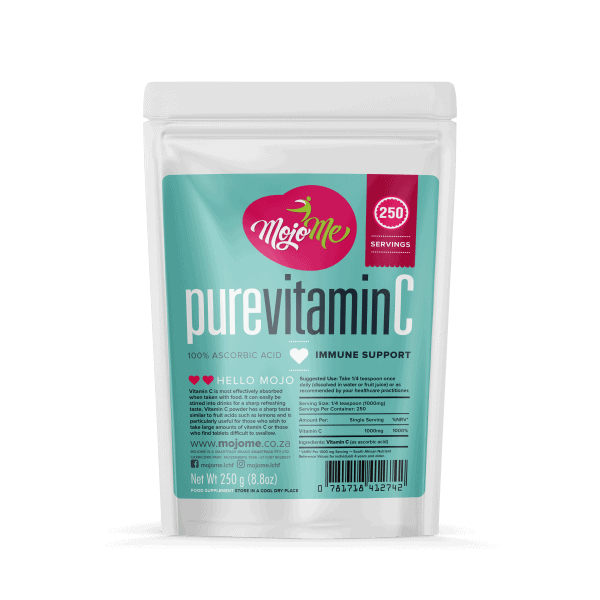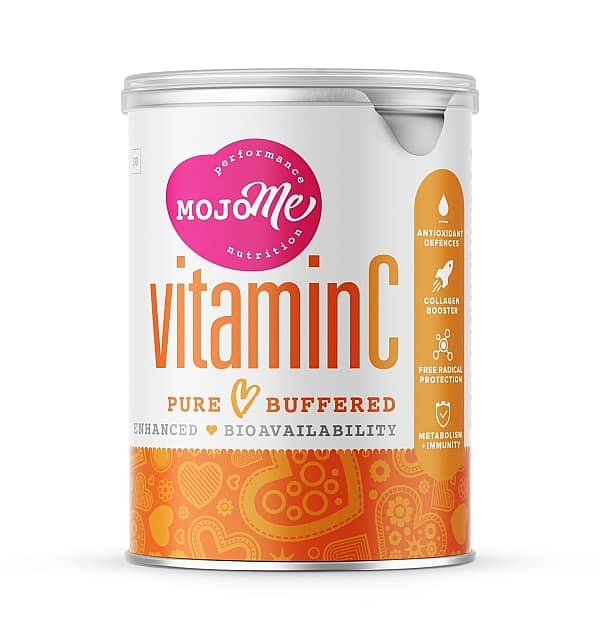Performance Nutrition South Africa
Vitamin C
Discover the Unparalleled Excellence of MojoMe Vitamin C
When it comes to supporting your immune health, choosing the right vitamin C product makes all the difference. At MojoMe, we pride ourselves not only on meeting but exceeding industry standards for quality and purity.
Our vitamin C formulation is meticulously crafted to provide your body with the exceptional support it needs. Here are reasons why MojoMe Vitamin C stands out from the crowd.
The Unique Benefits of MojoMe Vitamin C Formulation
Our expertly designed formula offers a host of unique benefits tailored to bolster your wellbeing:
- Enhanced Absorption: Our vitamin C is formulated for optimal bioavailability, ensuring your body can easily absorb and utilise the nutrient efficiently.
- Buffered for Sensitive Stomachs: We understand that vitamin C can sometimes cause discomfort. That's why we also offer a buffered version, which is gentle on the stomach while being effective.
- Antioxidant Powerhouse: MojoMe Vitamin C is packed with powerful antioxidants to help combat free radicals and support overall health.
- Sustained Release: Our sustained-release technology ensures a consistent supply of vitamin C to your body throughout the day.
Our Commitment to Quality, Purity, and Customer Health
At MojoMe, our dedication to your health is unparalleled. We are committed to providing you with products that you can trust:
- Stringent Quality Control: Every batch of our vitamin C undergoes rigorous testing to ensure supreme quality and purity.
- Purity Standards: We source the finest ingredients and maintain a transparent supply chain so you can be confident in the purity of our product.
- Customer-Centric: Your health is our top priority. We work tirelessly to formulate products that cater to the unique needs of each customer's health journey.
Choosing MojoMe Vitamin C means investing in a product that is as committed to your health and wellness as you are. Experience the difference with our scientifically advanced, quality-assured vitamin C formulation designed for maximum health benefits.
Vitamin C is not just a simple vitamin; it's a powerhouse that supports your body's natural defences.
Beyond its well-known role in protecting against the common cold, Vitamin C is crucial for the immune system at the cellular level and for maintaining healthy blood that courses through your lymphatic system. Let's dive into the science behind this essential nutrient and its significance in immune health.
Cell-Level Defence: How Vitamin C contributes to cellular immune response
Vitamin C plays a pivotal role in the body's cellular immune response. It is vital for the production and function of white blood cells, which are frontline defenders against infections. Vitamin C aids in their ability to consume and destroy invading pathogens. It also helps maintain the integrity of skin and mucous membranes, which act as barriers against disease.
Blood health and the role of Vitamin C in supporting the lymphatic system
The integrity of your blood is central to a robust immune system. Vitamin C is essential in the formation of collagen, which is needed for the growth and repair of tissues, and thus, it supports the walls of the capillaries.
A sturdy vascular system allows for optimal functioning of the lymphatic system, a key player in transporting immune cells and clearing away toxins. Adequate intake of Vitamin C ensures a well-functioning circulatory network and a lymphatic system prepared to battle potential threats.
- Vitamin C assists in the production of lymphocytes, crucial components of the immune system.
- It enhances the body's ability to produce antibodies, which tag harmful invaders for destruction.
- Vitamin C supports skin integrity, serving as the body's first line of immune defence.
For many of us, a well-functioning immune system is an unseen guardian, quietly warding off potential threats without a moment's thought.
However, for those with compromised immune systems, this protective barrier is less formidable, requiring reinforcements to maintain health and resilience.
Vitamin C is a cornerstone of these defences, providing vital support to those whose immune systems are under siege.
Understanding the Link Between Disease Susceptibility and Vitamin C
Individuals with compromised immune systems often face an uphill battle when combating viruses and infections that their bodies struggle to resist.
A deficiency in Vitamin C—a nutrient pivotal to immune defences—can exacerbate these challenges.
Vitamin C serves as a catalyst for producing white blood cells and enhancing their function, both critical factors in the body's response to pathogens. Without adequate levels of this essential vitamin, those with weakened immunity may find themselves more susceptible to illness and infection, underscoring the need for increased dietary focus or supplementation of Vitamin C.
Guarding Against Oxidative Stress and Aiding the Body's Healing Mechanisms
Oxidative stress, a relentless assault on cells by free radicals, is another foe that threatens delicate immune systems. Vitamin C, in its role as an antioxidant, protects against this cellular damage, shielding the body from the harmful effects of oxidative stress.
- Antioxidant Properties: Vitamin C neutralizes free radicals, reducing inflammation and bolstering cellular health. This is especially crucial for those with compromised immune systems, as damaged cells can lead to a cascade of health issues.
- Supporting Healing: Vitamin C is indispensable in the body's natural healing process. It contributes to the synthesis of collagen—a fundamental component of tissue repair—and expedites wound healing, ensuring that the body can recuperate more effectively from injuries or infections.
For those with a weakened immune system, maintaining sufficient levels of Vitamin C is not merely a wellness tip; it's a necessary strategy for health. Vitamin C establishes itself as an indispensable ally in the pursuit of health and well-being by fortifying the immune system, reducing susceptibility to disease, and aiding in the body's healing process.
Consuming foods rich in Vitamin C is crucial for maintaining your health. Citrus fruits like oranges, lemons, and grapefruits are well-known sources.
However, vegetables such as red peppers, kale, Brussels sprouts, broccoli, and strawberries also contain high levels of Vitamin C.
These foods offer Vitamin C, dietary fibre, flavonoids, and other essential nutrients that contribute to overall well-being.
When to Consider Vitamin C Supplements
While a balanced diet can provide adequate Vitamin C for most individuals, there are circumstances where supplements may be necessary. If you're experiencing difficulty in consuming enough Vitamin C through your diet, or if you're under increased physical stress or recovering from illness, supplements in the form of tablets, capsules, chewables, powders, or effervescent drinks can help fulfil your daily requirements.
Recommended Daily Intake for Optimal Health
The recommended daily allowance (RDA) for Vitamin C varies by age, sex, and life stage. Adults typically require between 65 to 90 milligrams per day. However, certain groups, like smokers and pregnant women, may need more. It's best to refer to the latest guidelines or consult with a healthcare professional to understand your specific needs.
How to Choose the Right Vitamin C Supplement for Your Needs
- Check the type of Vitamin C used in the supplement. Ascorbic acid is the most common form, but some products use mineral ascorbates for better digestion.
- Look for certifications from third-party organisations to ensure quality and purity.
- Consider the dosage. Since Vitamin C is water-soluble, taking too much at once can be inefficient. Timed-release options can help maintain stable levels throughout the day.
- Pay attention to the presence of additional nutrients, such as bioflavonoids, which may enhance the effectiveness of Vitamin C.
By weighing the benefits of food sources against the convenience and increased potency of supplements, you can make an informed decision to optimize your Vitamin C intake for better immune health and overall vitality.
Natural Dietary Sources of Vitamin C and Their Health Benefits
Consuming foods rich in Vitamin C is crucial for maintaining your health. Citrus fruits like oranges, lemons, and grapefruits are well-known sources. However, vegetables such as red peppers, kale, Brussels sprouts, broccoli, and strawberries also contain high levels of Vitamin C. These foods not only offer Vitamin C but also come with dietary fibre, flavonoids, and other essential nutrients that contribute to overall well-being.
When to Consider Vitamin C Supplements
While a balanced diet can provide adequate Vitamin C for most individuals, there are circumstances where supplements may be necessary. If you're experiencing difficulty in consuming enough Vitamin C through your diet, or if you're under increased physical stress or recovering from illness, supplements in the form of tablets, capsules, chewable powders, or effervescent drinks can help fulfil your daily requirements.
Recommended Daily Intake for Optimal Health
The recommended daily allowance (RDA) for Vitamin C varies by age, sex, and life stage. Adults typically require between 65 to 90 milligrams per day. However, certain groups, like smokers and pregnant women, may need more. It's best to refer to the latest guidelines or consult with a healthcare professional to understand your specific needs.
How to Choose the Right Vitamin C Supplement for Your Needs
- Check the type of Vitamin C used in the supplement. Ascorbic acid is the most common form, but some products use mineral ascorbates for better digestion.
- Look for certifications from third-party organizations to ensure quality and purity.
- Consider the dosage. Since Vitamin C is water-soluble, taking too much at once can be inefficient. Timed-release options can help maintain stable levels throughout the day.
- Pay attention to the presence of additional nutrients, such as bioflavonoids, which may enhance the effectiveness of Vitamin C.
By weighing the benefits of food sources against the convenience and increased potency of supplements, you can make an informed decision to optimise your Vitamin C intake for better immune health and overall vitality.
The information appearing on www.mojome.co.za is for educational and informational purposes only. Information and products are not intended to prevent, diagnose, treat or cure any disease or condition. All content should not be construed as or used as a substitute for professional nutritional, clinical or medical advice, diagnosis or treatment. Readers use the information provided solely at their own risk and discretion.

